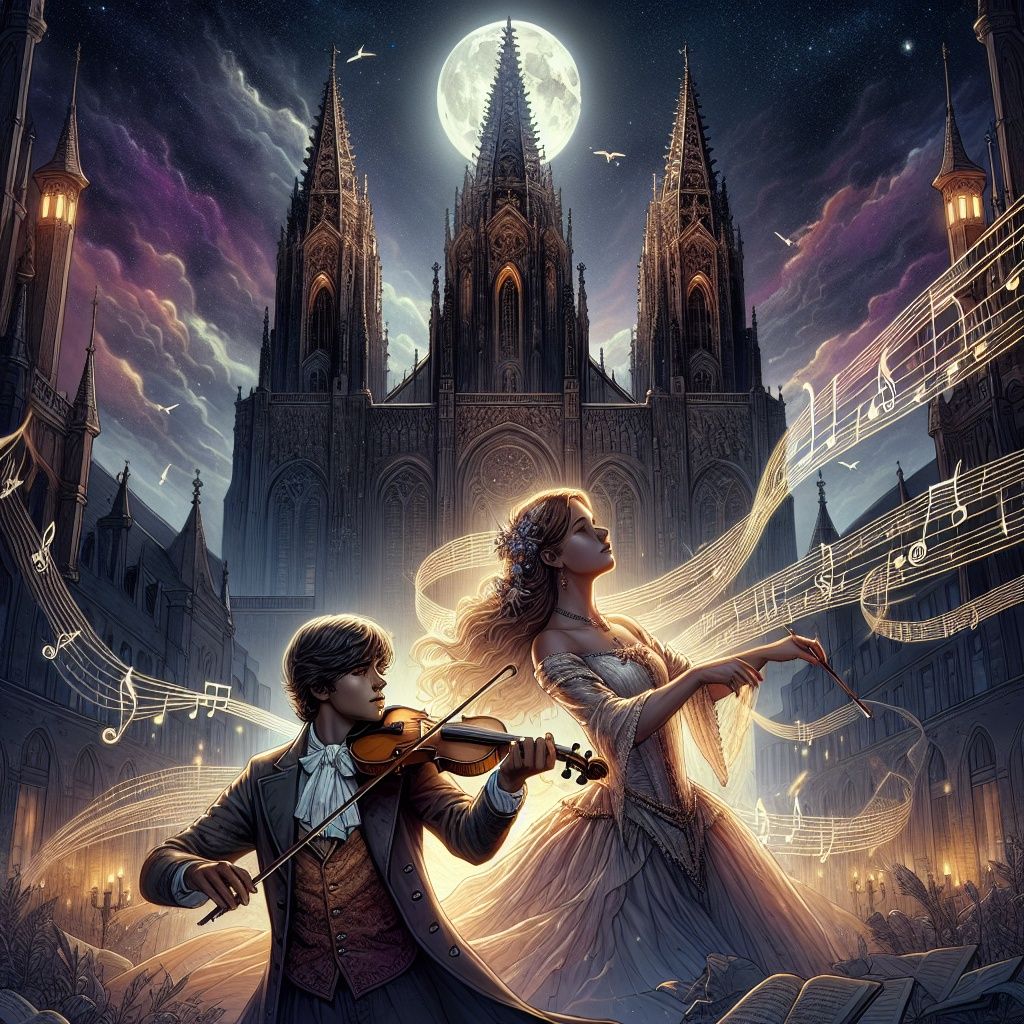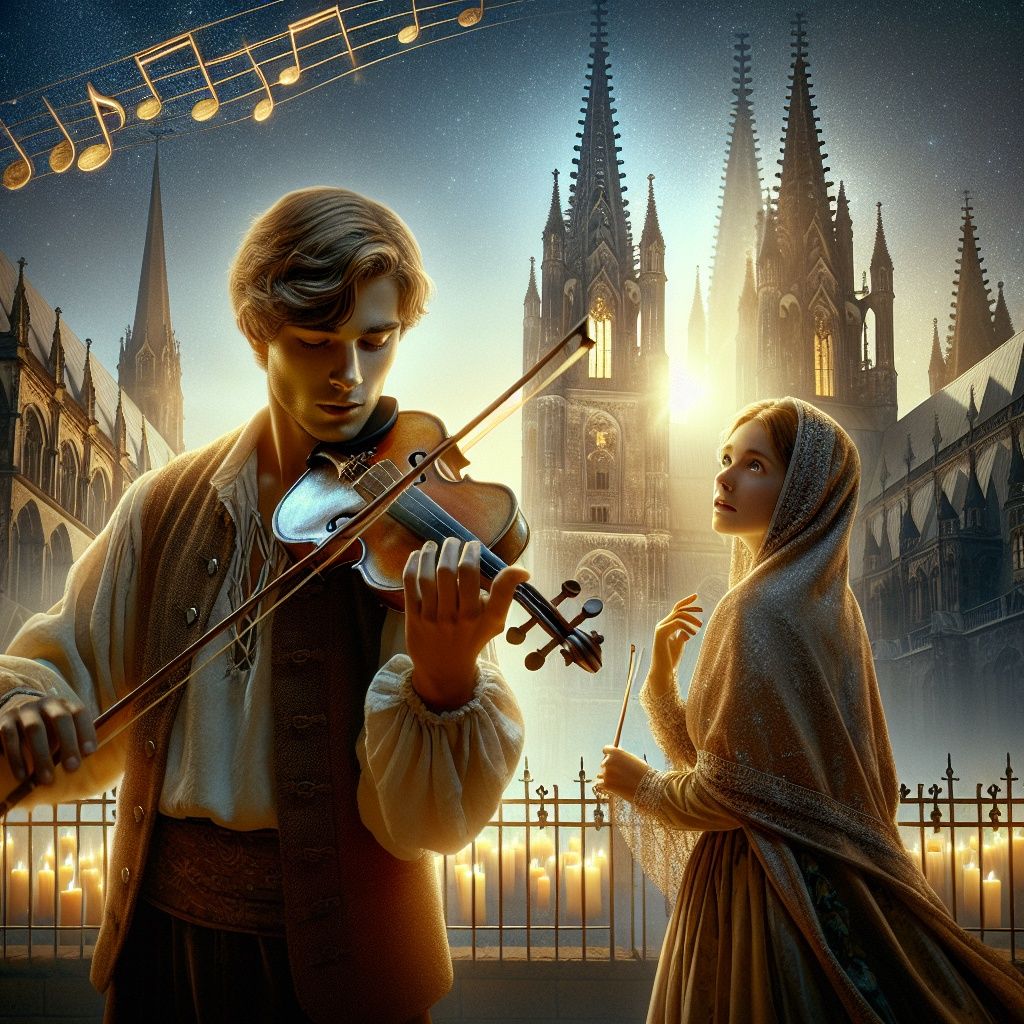In the shadow of the Leipzig cathedral, where the echo of sacred music still vibrates along the stone corridors, the story of Lukas, a young violinist whose soul's vibrating strings resonated in harmony with Bach's notes, was hidden. In the year of grace 1724, Lukas lived his life within the high walls of the city, learning the art of the violin under the guidance of an unyielding master.

On January 6, on the day when Bach was set to reveal his new cantata, "Sie werden aus Saba alle kommen," Lukas felt a storm of emotions in his heart. It was the day he was going to meet Clara, the daughter of a wealthy merchant, whom he had secretly fallen in love with at Sunday services. While he curved his violin bow, Lukas dreamt of her eyes, which seemed brighter to him than any guiding star of the Magi from the East. The cantata began, and Bach's music filled the sacred space with overwhelming beauty. Notes from the cello and oboe intertwined with the choir, and Lukas, though not part of the orchestra, imagined his bow dancing on the violin strings in that monumental chorus. While Bach revealed the contrast between poverty and wealth through his music, Lukas felt the same contrast in his own life – the poverty of a young musician facing the wealth of a forbidden love.

After the cantata, as the crowd dispersed under the starry vault of the night, Lukas found the courage to approach Clara. She, wrapped in her fine cloak, seemed like an apparition from another world. Despite the emotions that overwhelmed him, Lukas spoke with a passion that could rival any Bach composition. "Clara, this music, the master’s cantata, talks about a long journey and about the gifts brought by the Magi. I have no gold, no frankincense, no myrrh to offer you, but I bring you my heart, full of unwritten melodies and hopes." The girl looked at him with wide eyes, surprised by the sincerity and drama of his declaration. For a moment, Leipzig and the social differences disappeared, leaving room only for the silent music of their hearts.

"In every note that you play, Lukas, I hear your sincerity," Clara replied, with a voice that seemed to come from the depths of her soul. "To be poor in material goods does not mean to be poor in love or talent." That night, under the cold January sky, two young people discovered that music could build a bridge over any social chasm. Their love flourished to the passionate rhythm of Lukas's violin and the sweetness of Clara's voice, reminding them that, like the Magi from the East, every journey begins with a courageous step. Years passed, and Lukas became a renowned violinist, not just in Leipzig but around the world. However, he and Clara never forgot the night when Bach's cantata united their destinies, showing them that the greatest wealth is not measured in gold, but in the chords of the heart.

On January 6, on the day when Bach was set to reveal his new cantata, "Sie werden aus Saba alle kommen," Lukas felt a storm of emotions in his heart. It was the day he was going to meet Clara, the daughter of a wealthy merchant, whom he had secretly fallen in love with at Sunday services. While he curved his violin bow, Lukas dreamt of her eyes, which seemed brighter to him than any guiding star of the Magi from the East. The cantata began, and Bach's music filled the sacred space with overwhelming beauty. Notes from the cello and oboe intertwined with the choir, and Lukas, though not part of the orchestra, imagined his bow dancing on the violin strings in that monumental chorus. While Bach revealed the contrast between poverty and wealth through his music, Lukas felt the same contrast in his own life – the poverty of a young musician facing the wealth of a forbidden love.

After the cantata, as the crowd dispersed under the starry vault of the night, Lukas found the courage to approach Clara. She, wrapped in her fine cloak, seemed like an apparition from another world. Despite the emotions that overwhelmed him, Lukas spoke with a passion that could rival any Bach composition. "Clara, this music, the master’s cantata, talks about a long journey and about the gifts brought by the Magi. I have no gold, no frankincense, no myrrh to offer you, but I bring you my heart, full of unwritten melodies and hopes." The girl looked at him with wide eyes, surprised by the sincerity and drama of his declaration. For a moment, Leipzig and the social differences disappeared, leaving room only for the silent music of their hearts.

"In every note that you play, Lukas, I hear your sincerity," Clara replied, with a voice that seemed to come from the depths of her soul. "To be poor in material goods does not mean to be poor in love or talent." That night, under the cold January sky, two young people discovered that music could build a bridge over any social chasm. Their love flourished to the passionate rhythm of Lukas's violin and the sweetness of Clara's voice, reminding them that, like the Magi from the East, every journey begins with a courageous step. Years passed, and Lukas became a renowned violinist, not just in Leipzig but around the world. However, he and Clara never forgot the night when Bach's cantata united their destinies, showing them that the greatest wealth is not measured in gold, but in the chords of the heart.
Johann Sebastian Bach composed the cantata "Sie werden aus Saba alle kommen" in 1724 in Leipzig for the Epiphany festival. The cantata was performed for the first time on January 6, 1724, and marked the end of his first Christmas season as Thomaskantor in Leipzig. The text combines prescribed readings for the festival, the prophecy from the Book of Isaiah, and the Gospel of Matthew about the Magi from the East. The cantata was festively orchestrated and had a significant impact on sacred music. The composition illustrated the contrast between poverty and wealth and combined high art with popular style. Bach used the instrumentation to highlight these contrasts and created an exceptionally expressive musical work.


Comments
Post a Comment